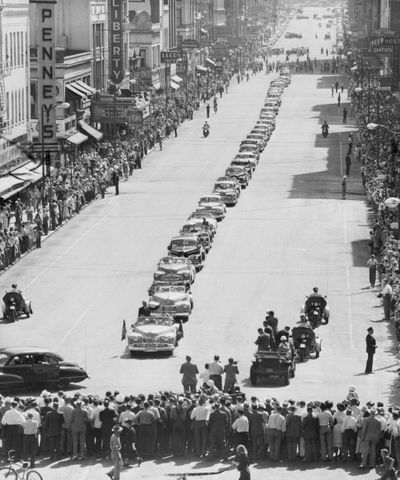This column reflects the opinion of the writer. Learn about the differences between a news story and an opinion column.
‘Second-worst’ label is not one Republicans often use against this newspaper

Rob Chase, a longtime political activist and sometime Republican officeholder, has leveled in an online blast what he most surely considers a stinging criticism at The Spokesman-Review. He might want to rethink it.
Chase, the former Spokane County treasurer who is, generally, an engaging guy to talk to even when he is tilting at windmills, takes issue with the newspaper’s coverage of political ally state Rep. Matt Shea. That’s not a problem, because almost anything of note we report will cause someone in the community to suggest we are, as my grandfather used to say, the north end of a southbound horse.
It is the epithet he hurls that he might want to reconsider.
He describes the coverage as coming from “what Harry Truman called ‘The 2nd Worst Newspaper in the US’ The Spokesman-Review – Not much has changed,” as Chase writes in inlandnwreport.com, a news-and-views website that offers links to such other sites as Redoubt News, the John Birch Society and North West Liberty News.
“The Spokesman Review still holds that distinction, with the Inlander now being the worst,” Chase contends.
Chase believes the newspaper is attacking Shea with “lies, innuendo and selective reporting” and rather helpfully provides links to a number of stories and columns and an editorial the newspaper published in August. He’s entitled to his opinion, and we don’t mind the links because they may increase our readership among a particular demographic that likely doesn’t subscribe to the paper.
Where he follows Alice through the looking glass, however, is when tries to compare his criticism of the paper and defense of Shea to President Harry Truman’s comment that The Spokesman-Review was “the second worst newspaper in the United States. That paper doesn’t know the truth in politics in its life and wouldn’t know the truth if it met it coming down the road.”
He throws in a picture of Truman talking from the back of a railroad car in 1948, but that’s not exactly what Truman said when he visited in 1948, and Chase either doesn’t know or ignores the context.
On that June day, the Democratic president had just arrived in town and was responding to a reporter’s question of “how it felt to invade a Republican stronghold.” Truman held up the morning copy of The Spokesman-Review, which had a banner headline proclaiming “Thousands give Truman a gala welcome in Butte” and asked if the reporter worked for the paper. When the reporter said he did, Truman replied “The Chicago Tribune and this paper are the worst in the United States. You’ve got just what you ought to have. You’ve got the worst Congress in the United States you ever had. And the papers – this paper – are responsible for it.”
A little while later, as he was leaving the train station, he saw the reporter and said “nothing personal to you, young man.” The newspaper, in an editorial the next day, said it didn’t take offense to being called the second-worst in the country but he probably overstated its influence in electing the Congress.
At the time, Truman was running for re-election, having most of his programs blocked by a Republican Congress, and he was pointing out some of the biggest benefits of the New Deal, like Grand Coulee Dam and the Columbia Basin project. In his later stump speech, he criticized voters who failed to turn out for the 1946 midterms, and blamed them for giving the GOP control of Congress.
Truman came back in June 1952, again angry with a Republican Congress and trying to head off the impending GOP landslide for Dwight Eisenhower. He ad libbed the line Chase quotes in his standard stump speech that again tried to emphasize all the things the region was getting for the spending that Republicans were criticizing and from an economy he said was better than they were acknowledging.
As the political reporter, I’ve heard “the second worst” line used as a slam against the newspaper by lots of people. But before this, it’s been by liberal Democrats complaining about coverage of their candidates or programs.
So it was strange to see it used by a good, conservative Republican like Chase. He apparently doesn’t realize Truman was criticizing the paper for supporting a Republican Congress, opposing some of his big government Democratic programs as he was out on the campaign trail, first against his GOP opponent and later to help a potential Democratic successor.
Chase also might want to consider whether the Inlander’s influence is really on par with the Chicago Tribune in its heyday, but that’s a whole other discussion.
Still, as Truman would say, “Nothing personal to you, young man.”
